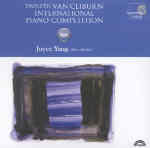Pianist Joyce Yang was the Silver Medal finalist in the 2005 International Van Cliburn Competition, from where these live performances stem. She displays excellent rhythm and articulation throughout Bach’s B minor French Overture (the two Bourrées are quite perky and characterful), although some of her caesuras and cadential ritards sound contrived rather than organically conceived (her slight hesitation before certain downbeats in the first Passepied). She also ignores most of the repeats.
Her big technique comes into its own in an impressively supple and elegant Liszt Don Juan Fantasy (the introduction’s smoothly dispatched chromatic runs and double notes, for instance). True, Yang’s tone turns flinty at loud moments, and you could imagine greater panache and diablerie, but her interpretation is infinitely more musical and mature than Lang Lang’s arrogant joyride through the score. Carl Vine’s two-movement First Sonata is a virtuoso showstopper that attracts today’s conservatory students and competitors just as the Barber Sonata’s similar “conservative modernism” did for an older generation. Yang throws herself into the music as if it were her last day on earth–just listen to her electrifying jagged block chords and rapid octave unisons.
I like the crispness and intelligent dynamic scaling she brings to Scarlatti’s D major sonata, but her jaunty basic tempo for the Liszt Sixth Rhapsody’s opening section is too glib for what the music expresses, and it doesn’t allow the ornaments to sing out with their fullest rhetorical potential. The famous “non-stop” octaves sound extremely well practiced, as opposed to forces of nature in the manner of Argerich’s youthful recording. Then again, Argerich didn’t play Carl Vine’s Sonata, so we’re even. In all, this Silver Medalist showcase boasts many Gold Medalist moments.
































